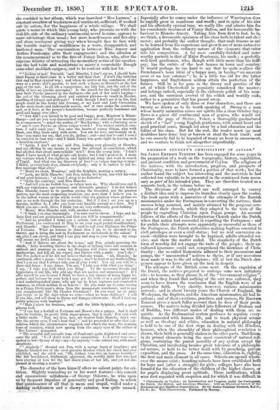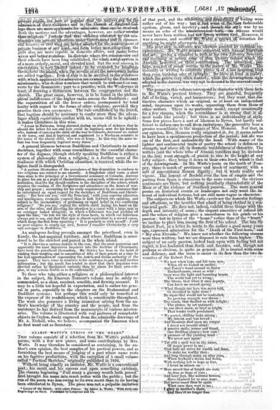EMERSON TENNENT'S CHRISTIANITY IN CEYLON. * Silt LAMES EMERSON TElt.A LIN
r has been engaged for sonic years in the preparation of a work on the topography, history' capabilities, and present condition and government of Ceylon. The religions of the natives, with the introduction, progress, rind prospects of Christianity, were to have formed a portion of that work; but the author found the subject too interesting and the materials he had collected too valuable to be presented in the condensed form neces- sary as port of his intended plan. They are therefore treated as a separate book, in the volume before us.
The divisions of the subject are well arranged to convey a distinct idea and to impress its branches clearly upon the reader. The book opens with a narrative of the attempts of the Romish missionaries under the Portuguese in converting the natives ; their success being nominal, and mainly attained by the gorgeous cere- monies of their church, which they adapted to the taste of the people by engrafting Christian upon Pagan pomps. An account follows of the efforts of the Presbyterian Church under the Dutch, when that nation had succeeded in expelling the Portuguese and for awhile their attempts were apparently as successful as those of the Portuguese, the Dutch authorities making baptism essential to civil privileges or even a civil status • but no real conversion en- sued—children were brought to be baptized, adults attended ser- vice, and there the matter ended. The simplicity of the Dutch form of worship did not engage the taste of the people ; their un- cultured ignorance could not comprehend the doctrines of Chris- tianity: the so-called Romanista adhered to their processions and pomps, the "unconverted" natives to theirs, or if any accessions were made it was to the old religions ; till at last the Dutch cler- gymen appear to have given up the task in des-pair.
The attempts of the British come next. On the expulsion of the Dutch, the natives prepared to undergo some new initiatory rite—to become, as they phrase it, of the "Government religion") and when they found that nothing of the sort was enforced; they seem to have drawn the conclusion that the English were of no particular faith. 'Very shortly, however, various missionaries arrived ; and in about twenty years the Church of England the Wesleyans, the Baptists, and the American missionaries, all had lo- cations ; and of their exertions, practices and success, Sir Emerses Tennent gives a much fuller account than he does of their prede- cessors. The natives being divided into followers of Brahma and of Buddha, two different modes of dealing with them are rer quisite. As the Brahmenical system professes to regulate every-
thing connected with human hie, to teach physical science as well as theology and ethics, education in natural phila is held to be one of the first steps in dealing with the Ifiniloos, because, when the absurdity of their philosophical revelation is shown, their faith is generally shaken in the other parts. Biuldhism, in its primal elements being the most consistent of natural reli- gions, containing the purest morality of any system except the Christian and inculcating besides great tolerance of a philosophi- cal nature, is held to be better dealt with by private exposition, and the press. At the same time, education is rightly, the first and main element in all cases. Schools are opened where- ever the means exist ; boarding-schools have been established both for boys and (after a struggle) for girls ; colleges have also been founded for the education of the children of the higher classes or for pupils displaying- great aptitude. These institutions, larch were first regarded with suspicion and for which it was difficult to
• Christianity in Ceylon; its Introduction and Progress under the Portaging, the Dutch, the Selfish, and American Missions ; with an Historical Sketch of the Brahmanical and Buddhist Superstitions. By' Sir Jams- hasetson Tannin, n.ca, &c. With Illustrations.. Published by Murray, It 1413 ellek OA 1X1 o lege ftleetivadv,Intiredsepplicieduilfoziadmissian -itisaniogni` . lattetioeiveti.
Both the motives and the advantages, however, are ratlieticalktiki
• .W A tictiblatitAkttimitettlyithl).-mis- 4nii . •.. - 1 11 :al ill 11411 II ' 4i7 enteorf- ifirEoutes; iSr Ifs. . . • r .
a , , , - , 1
EirAb4agi55.4.ff , • wilimta , ; the gar also are more cepa c a ., 4.•... `..-tter Y011 t gd 1444%11P13t44810 indliOritts Y4A(EAN14149,11a4c1 and their schools have been fone. established, the wittle.licitininaydtem is e .I, I • d. B t the rea;isucce in data ord rl moral an
i o Pth4 are added to ' tr4ness
if . . 115 " • Nie ,' ' ' IrithIWIliolacepp utsielt Lomat :, , tostigg missiehatiesi•rtab ■ deolinle inmate/is, thatiM beisidekerieddasieeni- Veke ht the Breif,tititZrlittiVit'lL,,IVel.. fetthitiallTit;IV leeit'a Oar„,,kit,h* i4'.!:'.-:°tihowever,' W'vffi,i.t444a4.illithilil 'lurch. 'LEO great cause,— 4 9: R. h . iiimuji,t,s;, tux pChical indifference of the higher ranks among Me the superstition of all the lower :orders; amtaktalianied by, total laxity With regard to' the forms Of .other-,yeli ' iis; provided they r practise their own ceremonies. The rideleiti hilted by the Diitilli, that baltistn.slititildltd*CeSsary`te cOnf6iiii re than the atlykn- - if! ...- 11 7•111:7I1I, - • ' /11141I11./.) ...:' / tages W ,iehrregasfregae# confers with vis,, seem* still to be upbejrg:
it makes aristians.in this wise. . . ,- , , - - •
" Amen inMalwans, being alarmed during an 'attack of sickness that he should :die before his son and heir could be baptized,: sent for his brother; who instead of earryingthe child: all the way to Colombe4orzetoed rue iitfatit in else to i and itaditt 140620 Anid _registered by a Wesh3yan minister in 'the -noble of the absent child, Who was at home. In this, way the same in-
fant hse bees frequently baptized AutinTAtues." . . .
:A.:general likeness between Buddhism and Christianitv in moral doctrines, together with some teeemblatee in the essential charac- ter Of the dogmas, (though strictly speaking Buddhism is rather a system of philosophy. ,than •.i. religion,) is a, further cause of the readiness with 41iith'ehriStion edueatiOn is received While the re- ligion itselfis4lisiegarded.
..4!' A curious illuatt•ation of the prevalence of this disposition to conform to two religious was related to me reeently. k6inghalease chief cattle ..a short time since to the principal of a Government seminar:Alit ColomOo, desirous to place his son as a pupil the institution, and egreedi-without an instant's hesitation, that the boy, should conform to the discipline of the school, which recjuires the reading of the Scriptures and attendaueo,mi the hours of wor- ship and prayer ; accounting for his ready aceuieseeriee by an assurance that he entertained au equal;respeet for the doctrines of Buddhism aud,Cbristl- unity. ' But how Can you,',Fiald the Principal, 'with Your superior education and intelligence, reconcdoryourself thus to halt between two opinions, ., and submit to the iucoushitkaby, of professing an equal belief in two condietfng religions r. .‘ Do you see,' replied the subtile chief, leying his hand on Op aria Of the Other, and directing his attention to ayanoe with a large sp4,0 an outrigger lashed alongside; in which A fisherman Was just pusiiip,i,611 upon the lake,- 'do 'Yoi -see !the style of these beats, in which our fishermen always put to sea, and that that spar is almost equivalent' to a second canoe, which keeps the firstfriou upsetting? It is precisely so with myself : I add on ,peter religion to steady my, own, 3ecause•I consider CAristianily a e#y safe outrigger to Build-Alain.' . • • i - ' ":'
An analogous feeling prevails amongst the priesthood, even' in Kandy, the last-a,oa, territory, and where Buddhism is Aonsi- dered to be the striebes and purest in the whole island. -
"It is likewise a earl ..fe.ature in the case, that the most numerous and apparently the indst'in 'ens inquirers into the doctrine of Christianity have been the priesthood themselves.; ' .Ifir•.-r_Oakley has been in the habit of visiting their templealand:to.assemblies of ,fitity, of their priests at iktime he his tioctopporturatiess,of esponeding the ,tenetatenddiviae authority of the .respel. They have come in numbers to his residence ;to ask for still further information,. but the.maalt„has tended to show that their ineuiriea were directed rather by theole„eiCal &lineally than by alarm for their oliat reli-
gion, or anyacriolut d'afifs 'is to de authenticity. ,
To those who talse;eithera,religiouss• or a philosophical interest in the subject„, gir,Zniei'son4etinent's volume may. he,, safely re- lionmiended as. a &ail succinct, sensible, and dewing account. It may be a little to d hopeful in expectation, and is rather too gene- ral in parts, espeoal/y in the chapters on the /3r_ahmanical and Buddhist systems; but perhaps this could' only '‘b. temedied at the expense of ita readableness, which is considernble'tliro4hout. The work also possesses 'a living animation arisinglioni'the au- tholes knowledge of 'tile -*retry and the people, and from the assistance he has 41,i,fectAIMI the manuscripts of various mission- . aries. The volume is ithistrated with real-piotures of remarkable object s in.Ceyleue finely engraved from th0.144moble drawings of Mr. A. Nioholl, who, we believe, accompaniedBir'Bme.rson when he List went Out as .Seeretary. • • , ,,, • ,, ,. •,'.



























 Previous page
Previous page